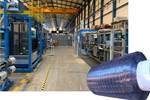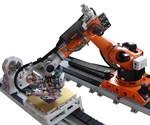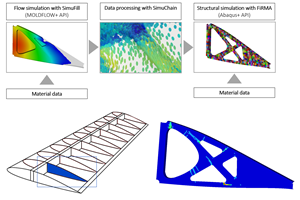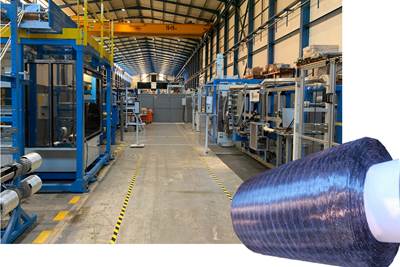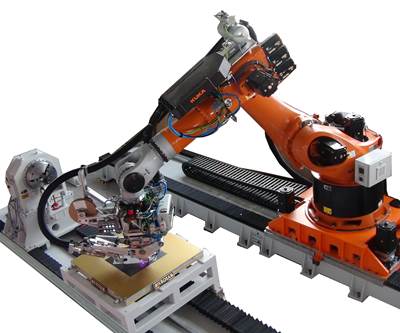Single-step prepreg slitting and rewinding unit to advance NIAR ATLAS aviation research
Mikrosam, in collaboration with Composite Automation, delivers this custom-made machine, which offers slit flexibility, in-process inspection system and performs quality control on the fly.
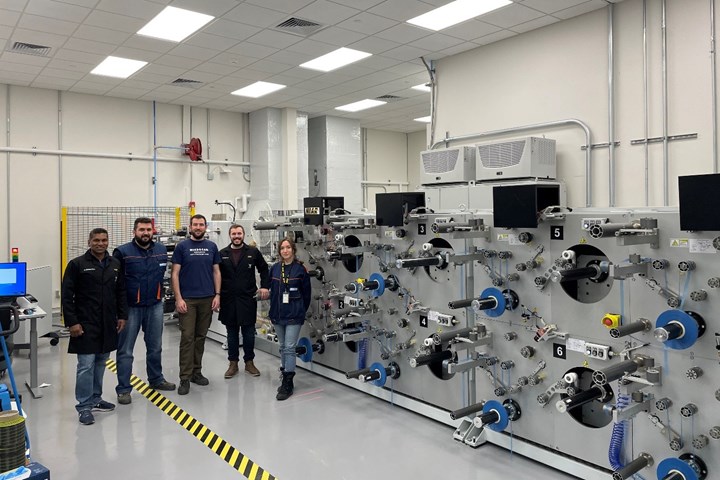
Mikrosam’s prepreg slitting and conversion unit at NIAR ATLAS. Photo Credit: Mikrosam
Mikrosam (Prilep, Macedonia), a company that offers automated solutions for manufacturing advanced composites, in collaboration with Composite Automation (Cape Coral, Fla., U.S.), have completed the installation of its latest custom-made prepreg tape slitting and tow-rewinding machine at the National Institute for Aviation Research (NIAR) at Wichita State University (Kansas).
NIAR selected both companies to deliver a single-step slitting unit to facilitate its need to perform research on a variety of composite prepregs at its Advanced Technologies Laboratory for Aerospace Systems (ATLAS). ATLAS is a multi-disciplinary manufacturing environment aimed at preparing engineers for what NIAR terms “the factory of the future,” as well as aiding industry with advanced material research with automated manufacturing technologies.
“With the addition of a Mikrosam slitter to our portfolio of automated manufacturing equipment, we are able to support the demand from multiple automated fiber placement [AFP] machines at NIAR — conducting research in a timely manner and supporting our industry partners’ slit-tape material needs,” says Dr. Waruna Seneviratne, ATLAS director. "The integrated in-process inspection system and the machine-learning algorithm for detecting defects allows us to perform quality control on the fly.”
According to Mikrosam, the prepreg slitting equipment is a single-step process for slitting of unidirectional (UD) thermoset and thermoplastic prepreg tapes and rewinding them on multiple station traverse winders. The equipment is dedicated to slit prepreg tape from maximum widths of 24.5 inches (600 millimeters) down to 0.25-0.5 inches (6.35-12.7 millimeters), and then rewind on a spool that can be used for AFP. It can also reportedly be used for slitting down to 3-6-inch (75-150-millimeter)-wide tapes on a spool that can be directly used in automated tape laying (ATL) processes.
Mikrosam says it offers one of the most cost-competitive and advanced prepreg slitting and rewinding units on the market. These units, according to the company, are ideal for operations in which customers demand flexibility in the quantity and types of slit and rewound prepreg tapes. This machine will facilitate NIAR's research goals with several key benefits including:
- Flexibility usage such as wide to narrow tape slitting, and preparation of up to eight spools or pancake cassettes at a time;
- Effectiveness with maximum linear speed of up to 60 meters per minute depending on the specific material;
- In-line splicing of the prepreg tapes, ideal for preparing bigger spool packages;
- Future expandability beginning with eight positions of traverse spool winding which can be upgraded to 48 positions;
- Tension control unit ensuring constant and accurate unwinding important for the quality of the slitting process;
- Laser guiding system that assists the operator for precise positioning of the mother prepreg spools;
- Automatic Online Inspection System: A Mikrosam technology system that inspects and automatically detects errors on the slit tape (e.g., tow width and thickness, twisted tow, fuzz detection, foreign object detection, splicing detection) before it is rewound on the spool;
- Quality Control System (QCS): Records control system and related sensor data for monitoring, traceability and quality improvement of the process.
“With the proliferation of AFP units in research, the demand for efficient, scalable in-house slitting units has grown,” says Dimitar Bogdanoski, sales manager at Mikrosam. “Mikrosam is a pioneer in such units which help customers prepare prepreg tapes on-demand, thus saving costs, controlling quality and reducing lead-time and risk in new ideas. Working with Composite Automation, we are proud to help NIAR be more productive in research on manufacturing composite parts.”
Related Content
Optimizing robotic winding of composite tanks and pipes
Pioneer in mandrel-based reinforced rubber and composite products, TANIQ offers TaniqWindPro software and robotic winding expertise for composite pressure vessels and more.
Read MoreTesting to support composite bolted joint analysis
An overview of ASTM Standard Guide D8509, and its coupon-level mechanical testing of design properties for analyzing composite bolted joints.
Read MoreProving thermoplastic composites match carbon fiber/epoxy performance in road bikes
CDCQ, LxSim, Addcomp and Argon 18 collaborate to optimize a carbon fiber/PA6 bike seat post, democratizing AFP and demonstrating materials and process for future designs and production.
Read MoreImproving carbon fiber SMC simulation for aerospace parts
Simutence and Engenuity demonstrate a virtual process chain enabling evaluation of process-induced fiber orientations for improved structural simulation and failure load prediction of a composite wing rib.
Read MoreRead Next
Novel dry tape for liquid molded composites
MTorres seeks to enable next-gen aircraft and open new markets for composites with low-cost, high-permeability tapes and versatile, high-speed production lines.
Read MoreMikrosam to supply ATP machine for UD-CCM research
Initial University of Delaware studies conducted with the automated tape placement (ATP) machine will evaluate placement of thin ply materials to support current projects with NASA.
Read MoreAll-recycled, needle-punched nonwoven CFRP slashes carbon footprint of Formula 2 seat
Dallara and Tenowo collaborate to produce a race-ready Formula 2 seat using recycled carbon fiber, reducing CO2 emissions by 97.5% compared to virgin materials.
Read More

